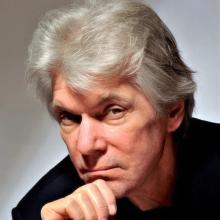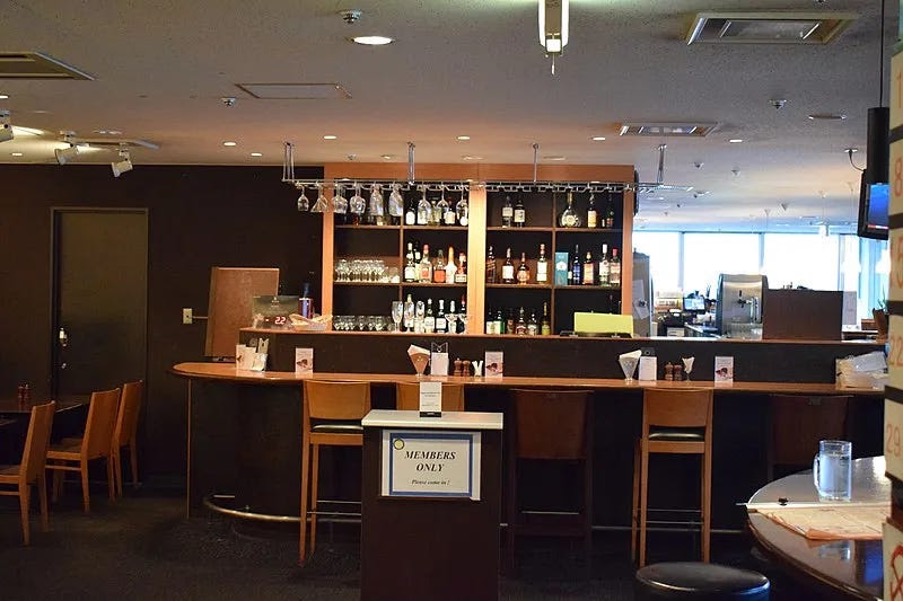Issue:
September 2025 | Club History Part 2
The second in a three-part series on the history of the FCCJ

During the Yurakucho Denki Building era, starting in 1976, the FCCJ was led by a corps of fascinating journalists who chronicled the global trade wars sparked by the low-price, high-quality exports from Japanese industry and the epic Bubble Era of Japan that ensued, highlighted by Sony’s purchase of Columbia Studios and Mitsubishi buying up Rockefeller Center. Among the leading reporters of the era was Karel van Wolferen, the Dutch author of the groundbreaking “Enigma of Japanese Power,” a brilliant orator who loved to rail about the evil influence of America on Japan — and drink white wine in copious amounts.
Another character was Italian photo journalist/filmmaker and Sky News reporter Pio D’Emilia, white-bearded, with horn-rimmed glasses and a fake cigar always clenched between his teeth, who did a series of well-known film documentaries on Japan, including a behind-the-scenes look at the Shinjuku yakuza. Pio was a socialist who tried to organize the FCCJ staff into a union. Then there was Bradley Martin, big, burly, brilliant and gregarious, author of the classic book on North Korea, Under the Loving Care of the Fatherly Leader and the novel Nuclear Blues, set in the DPRK. Bradley was famous for liking I.W. Harper – “best consumed in the fall”.
Additionally, there was Anthony Rowley, urbane UK correspondent for the Singapore Business Times and a 30-year veteran of the Asian beat, frequently perched at the counter he had built near the Main Bar entrance; Khaldon Azhari, Syrian-born correspondent for Al Sharq, and president of PanOrient News, a good natured to a fault and perennially late, running as members liked to say on Arab Time; Monzuru Huq, the distinguished Tokyo bureau chief of Bangladesh’s Prothom Alo. Peter Langan, a silver-tongued Liverpudlian and onetime Bloomberg bureau chief, Andrew Horvat, an articulate and opinionated Hungarian-born reporter who represented Associated Press and the Independent, among others over a long career in the city and who was the author of the successful Japanese language book Nihon-jin Ni Naritai (I Want to Become Japanese); Mike “Buck” Tharp of the Wall Street Journal, veteran correspondent of many wars and Roger Schreffler, an intense and verbose correspondent for Wards Auto, who was the unofficial historian for the Club and its conscience. All had been Club presidents.
Among the most high-profile was a former diplomat turned Bureau chief for the Australian named Gregory Clark, author of several well-known books in Japanese. There was also two-time Club president Suvendrini Kakuchi, Robert Neff, the son of missionary parents who was raised in Japan, who was the longtime editor of Business Week. It was Neff who had coined the term “revisionist,” referring to a school of journalists who viewed the new superpower Japan as a threat to world peace. There was also Henry Scott-Stokes, New York Times correspondent and author of Mishima, and Haruko Watanabe, a graduate of the University of Missouri School of Journalism, who was Bureau chief of the Press Foundation of Asia.
Among the Associates was the popular was Mary Corbett, a journalist, author and filmmaker, born in Yokohama, who knew more about Japanese politics and society than any 10 foreign correspondents combined. There was Mehdi Bassiri, an Iranian businessman who had sought asylum in Tokyo during the Iran revolution of 1979 when he was a diplomat working at the Iranian Embassy in Tokyo. Sandra Mori, a Daily Mainichi writer and Bob Kirschenbaum, head of PPS, were longtime regulars. (Mori has the distinction of being the only current member who has regularly used all the buildings the FCCJ has occupied to date.)

For a corps of correspondents who were supposed to be elucidating Japan to the outside world, not many of them could speak Japanese, let alone read or write it. Horvat, Jameson, Clark, Watanabe and Neff were among the long-term journalists of those who could handle the language. Horvat even appeared before the Emperor representing the Club. Most of the others had to do their jobs through interpreters and secretaries, which I guess was understandable in the case of reporters who rotated to another global destination after four years in Tokyo. The New York Times and Washington Post changed bureau chiefs every few years. But there were also reporters who had been in Tokyo for 10 or 20 years and who still could not speak a word of the language. And they were seemingly unable to venture outside the club without a guide or an interpreter. Even Scott-Stokes, who died in April, was, shall we say, less than fluent.
What these correspondents could do, however, was write. They could pound out a 1,500-word story in two hours and come up with snappy leads and inventive ways to end a piece. I knew a correspondent who had dictated a completely new 3,000-word story over the phone, back in the pre-email era, on deadline day, because the one he had submitted hours earlier, was unusable, for reasons I forget. It was awe-inspiring and, at the same time, depressing to hear that. I could work for days on a 3,000-word story. It took years and years and years of writing before I could even approach that level.
Being in such an environment was educational. At the end of each work day one could sit down at the Main Bar and listen in on intelligent, informed discussions about important global topics that often degenerated into drunken arguments as the evening wore on and alcohol consumption increased.
In a sense, it was like going to the gym every day. It sharpened you up.
It was also never dull.
Former FCCJ president and Daily Telegraph reporter Al Cullison once took a broken beer bottle and attacked John Harris of CBS, an act for which he was banished from the Club for six months. Cullison, had some kind of alcohol-induced hallucination about Harris and lunged at him with beer bottle that he had broken on the counter, cutting his jugular vein causing him to lose an enormous amount of blood. Had the ambulance not arrived in time, there would have been a murder on the premises.
There were several other incidents. The diminutive Cullison once picked a fight with Brad Martin and wound up on the floor, which is what happened to anyone who got physical with the 6’3” 240-pound Baltimore Sun bureau chief. Mike Tharp’s dancing on a tabletop while singing “Blue Suede Shoes” led to an altercation with historical revisionist and Nanjing Massacre denier, and Nippon Kaigi member Hideaki Kase.
Roger Schreffler became so upset over a disagreement he had had with the Board of Directors that he took his photo from the wall in the lobby where photos of all ex-presidents were displayed and smashed it over a table.
If on some nights the Club seemed like the WWE, on others, it was more like the Playboy Mansion. A famous prize-winning Italian journalist made history late one night by entertaining a young lady on the 19th-floor Club pool table, completing his task despite an unexpected interruption by a Club employee. The flustered employee bowed, apologized for the intrusion, and quickly exited. The journalist bowed back from his semi-prone position and resumed what he was doing. Another longtime member was suspended for six months after he had jokingly sang in the presence of a female member of the Club, “Do you want to dance in your underpants?” She filed a complaint for sexual harassment.
In some ways, the foreign correspondents reminded me of the gaijin baseball players who met regularly after games in Tokyo at night spots like the Country and Western Bar Chaps, where they would get drunk and complain about life in Japan, their maltreatment at the hands of their employers, and how try as they might they could never ever understand the insular Japanese mentality.
The big complaint at the FCCJ was the lack of access, specifically the restrictive kisha club system, which blocked them from attending most government press conferences and made their work twice as hard as it was for Japanese reporters. It was reminiscent of the expanded strike zone American sluggers like Reggie Smith and Warren Cromartie had complained about while playing for the Yomiuri Giants.
But if you really wanted to get the story, you could. John Saar, a one-time correspondent for the Washington Post, used to say that any reporter worth his salt could do his stories without a press card and without attending press conference.
The FCCJ played a central role in coverage of major news events throughout the 20th century and into the 21st.
The first major press conference of the doomsday cult Aum Shinrikyo, which carried out the sarin gas attack on the Tokyo subway system in March 1995, was held at the FCCJ in April 1995 and drew wide press coverage. Fumihiro Joyu, Aum’s spokesman, appeared wearing the powder blue robes the group was noted for, speaking fluent English. The event was carried live by many Japanese TV networks.
Coverage also included the Olympus and Nissan scandals, both of which illustrated the perils of being a foreign executive in a Japanese company. Olympus appointed England’s Michael Woodford as CEO in 2011, but he lost his job shortly after he disclosed a major accounting fraud. Woodford was fired, and the scandal led to the resignation of the company’s entire board and the arrest of several senior executives, but he was later awarded £10 million in an out-of-court settlement with Olympus over his dismissal. Woodford had abandoned an earlier proxy fight to take control of the company after it became apparent Olympus’s institutional investors were uncomfortable with the Englishman’s combative style.
Carlos Ghosn became hugely famous in Japan, first for leading the restructuring and revival of struggling Nissan Motors in 1999, then later for his arrest in the winter of 2018 for allegedly understating his compensation, a circumstance brought about by his enemies within the corporation. Ghosn spent months acquainting himself with Japan’s criminal justice system, undergoing interrogation several hours every day without his lawyer present and sleeping in an unheated cell with the light on all night. Eventually granted bail, which cost him more than a million dollars, but denied permission to see his wife, Ghosn fled to Beirut, smuggled out in a box from Kansai International Airport.
In the midst of a national press corps that ranked last among G7 nations in the annual Reporters Without Borders’ World Press Freedom Index, the FCCJ remained resolutely independent, giving a voice to political protestors and refugees frequently turned away from Japan’s pro-government National Press Center, including the Dalai Lama.
Portions of the article originally appeared in Tokyo Junkie by the author and published by Stone Bridge Press in 2021.
Robert Whiting is a best-selling author and journalist who has written several successful books on sport and contemporary Japanese culture, including You Gotta Have Wa (1989), The Meaning of Ichiro (2004), Tokyo Junkie (2021) and Gamblers, Fraudsters, Dreamers & Spies: The Outsiders Who Shaped Modern Japan (2024).

